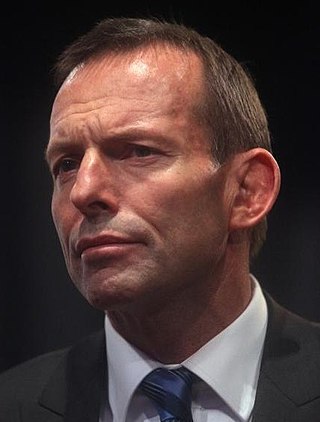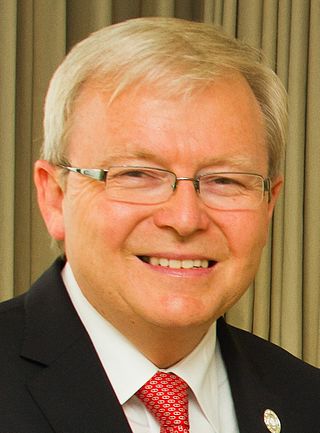Related Research Articles

Kevin Michael Rudd is an Australian diplomat and former politician who served as the 26th prime minister of Australia from 2007 to 2010 and June 2013 to September 2013. He held office as the leader of the Australian Labor Party (ALP). Rudd has been the 23rd and current ambassador of Australia to the United States since 2023.

Julia Eileen Gillard is an Australian former politician who served as the 27th prime minister of Australia from 2010 to 2013. She held office as leader of the Australian Labor Party (ALP), having previously served as the 13th deputy prime minister of Australia from 2007 to 2010, under Prime Minister Kevin Rudd. She is the first and only female prime minister or deputy prime minister in Australian history.

Anthony John Abbott is an Australian former politician who served as the 28th prime minister of Australia from 2013 to 2015. He held office as the leader of the Liberal Party of Australia.

The treasurerof Australia, also known as the Federaltreasurer or simply the treasurer, is the minister of state of the Commonwealth of Australia charged with overseeing government revenue collection, federal expenditure and economic policy as the head of the Department of the Treasury. The current treasurer is Jim Chalmers, who was appointed by Prime Minister Anthony Albanese in May 2022 following the 2022 Australian federal election.

Wayne Maxwell Swan is an Australian politician serving as the 25th and current National President of the Labor Party since 2018, previously serving as the 14th Deputy Prime Minister of Australia and Deputy Leader of the Labor Party from 2010 to 2013, and the Treasurer of Australia from 2007 to 2013.

The Department of the Treasury, also known as TheTreasury, is the national treasury and financial department of the federal government of the Commonwealth of Australia. The treasury is responsible for executing economic and fiscal policy, market regulation and the delivery of the federal budget with the department overseeing various agencies including the Australian Taxation Office (ATO), the Securities and Investments Commission (ASIC) and the Competition and Consumer Commission (ACCC). The Treasury is one of only two departments that have existed continuously since Federation in 1901, the other being the Department of the Attorney-General.

The 2008 Australian federal budget for the Australian financial year ended 30 June 2009 was presented on 13 May 2008 by the Treasurer of Australia, Wayne Swan, the first federal budget presented by Swan, and the first budget of the first Rudd government.
Kevin Page is a Canadian economist. He was the first Parliamentary Budget Officer for Canada. He was appointed to the position on March 25, 2008, and his term was completed on March 22, 2013. He now teaches at the University of Ottawa. In 2013, Page was named as the Jean-Luc Pepin Research Chair on Canadian Government. In 2016, Page became the head of the newly created Institute of Fiscal Studies and Democracy (IFSD), a think tank with a focus on public finance and policy at the University of Ottawa.

The first Rudd government was the executive Government of Australia formed by the Australian Labor Party (ALP) and led by Prime Minister Kevin Rudd. The Rudd government commenced on 3 December 2007, when Rudd was sworn in along with his ministry. This took place just nine days after the defeat of the Howard government, which was a Coalition of members of the Liberal and National parties, at the 2007 federal election. The Rudd government concluded on 24 June 2010 when Rudd, under pressure from an impending leadership caucus ballot, stepped down from the leadership of the ALP and was succeeded by his deputy, Julia Gillard. Rudd was re-elected leader of the Labor Party in 2013 and served a second term as prime minister.

The Office of the Parliamentary Budget Officer is an office of the Parliament of Canada which provides independent, authoritative and non-partisan financial and economic analysis. The office is led by the Parliamentary Budget Officer, an independent officer who supports parliamentarians in carrying out their constitutional roles of scrutinizing the raising and spending of public monies and generally overseeing the government's activities.

The Office for Budget Responsibility (OBR) is a non-departmental public body funded by the UK Treasury, that the UK government established to provide independent economic forecasts and independent analysis of the public finances. It was formally created in May 2010 following the general election and was placed on a statutory footing by the Budget Responsibility and National Audit Act 2011. It is one of a growing number of official independent fiscal watchdogs around the world.

The Gillard government was the Government of Australia led by the 27th Prime Minister of Australia, Julia Gillard, of the Australian Labor Party. The Gillard government succeeded the first Rudd government by way of the Labor Party leadership spill, and began on 24 June 2010, with Gillard sworn in as Prime Minister by the Governor-General of Australia, Quentin Bryce. The Gillard government ended when Kevin Rudd won back the leadership of the Australian Labor Party on 26 June 2013 and commenced the second Rudd government.

The 2011 Australian federal budget for the Australian financial year ended 30 June 2012 was presented on 10 May 2011 by the Treasurer of Australia, Wayne Swan, the fourth federal budget presented by Swan, and the first budget of the Gillard government. The budget forecast a $22.6 billion deficit and delivered a $44.4 billion deficit.

The Clean Energy Act 2011 was an Act of the Australian Parliament, the main Act in a package of legislation that established an Australian emissions trading scheme (ETS), to be preceded by a three-year period of fixed carbon pricing in Australia designed to reduce carbon dioxide emissions as part of efforts to combat global warming.

The 2012 Australian federal budget for the Australian financial year ended 30 June 2013 was presented on 8 May 2012 by the Treasurer of Australia, Wayne Swan, the fifth federal budget presented by Swan, and the second budget of the Gillard government. The budget was described as a "battlers" budget with benefits geared towards families and low income earners. It forecast a surplus of $1.5 billion in the financial year ended 30 June 2013.

The 2013 Australian federal budget for the Australian financial year ended 30 June 2014 was presented on 14 May 2013 by the Treasurer of Australia, Wayne Swan, the sixth federal budget presented by Swan. The 2013 budget estimated total revenue of A$387.7 billion and spending of A$398.3 billion, a deficit of A$18 billion, with a return to surplus expected in the 2015 Australian federal budget. Some of the measures in the budget had been announced by various Ministers before the budget.

The second Rudd government was the federal executive Government of Australia led by Prime Minister Kevin Rudd of the Australian Labor Party. It commenced on 27 June 2013 and ceased on 18 September 2013. Rudd had previously served a term as Prime Minister from 2007 to 2010 and been replaced by his deputy Julia Gillard, following an internal party spill. Rudd regained the Labor Party leadership by successfully re-challenging Gillard in a June 2013 party spill. On 5 August, Rudd called an election for 7 September 2013, which resulted in the defeat of his government by the Liberal/National Coalition led by Opposition Leader Tony Abbott.

The Abbott government was the federal executive government of Australia led by the 28th Prime Minister Tony Abbott. The government was made up of members of the Liberal–National Coalition. The Leader of The Nationals, Warren Truss, served as Deputy Prime Minister. Following the 2013 Australian federal election held on 7 September, the Coalition defeated the second Rudd government, ending six years of Labor government. The Abbott government was sworn into office on 18 September 2013. Less than two years later on 14 September 2015, Malcolm Turnbull defeated Abbott in a leadership ballot, 54 votes to 44 and the Turnbull government became the executive government of Australia.

James Edward Chalmers is an Australian politician. He has been Treasurer of Australia in the Albanese government since May 2022. He is a member of the Australian Labor Party (ALP) and has served as a member of parliament for the division of Rankin since 2013.
In Australia, there are four parliamentary departments that provide advice and support to both Houses of the Australian Parliament, their members, committees as well as services to Parliament House, including visitors. The parliamentary departments operate under the Parliamentary Service Act 1999 and report only to one or both of the presiding officers of the Australian Parliament — the President of the Senate and the Speaker of the House of Representatives — who in turn are responsible for the departments to their respective house of parliament. Employees of these departments constitute the Australian Parliamentary Service, which is not part of the Australian Public Service. The parliamentary departments are independent of the Australian Government, though the Merit Protection Commissioner provides employment services to both services on an equivalent basis.
References
- ↑ "Case study - Parliamentary Budget Office". National Archives of Australia. Australian Government. Retrieved 13 December 2018.
- ↑ "Australia" (PDF). OECD Journal on Budgeting. 2015 (2): 31–48. 2016. Retrieved 18 January 2019.
- ↑ Parliamentary Service Act 1999 (Cth) s 64B
- ↑ Mulgan, Richard (13 September 2011). "Costing the promises: what is a Parliamentary Budget Office?". The Conversation. Retrieved 18 January 2019.
- ↑ Taylor, Lenore; Murphy, Katharine; Pankhania, Madhvi; Bennett, Christian (27 June 2013). "Julia Gillard: a life in politics". The Guardian. Retrieved 14 December 2018.
- ↑ Burgess, Verona (31 March 2011). "PBO a no-brainer for Abbott". Australian Financial Review. Fairfax Media. Retrieved 18 January 2019.
- ↑ "The Functions and Impact of Fiscal Councils" (PDF). IMF Policy Paper. International Monetary Fund. 16 July 2013. p. 47. Retrieved 18 January 2019.
- ↑ Holmes, Brenton. "Hard days and nights: the final 147 days of the Gillard Government". Research Papers 2013–14. Parliamentary Library (Australia). Retrieved 18 January 2019.
- ↑ Swan, Wayne. "Press Release - Parliamentary Budget Office amendments pass the Senate [20/06/2013]". Treasury Portfolio Ministers. Australian Government. Retrieved 18 January 2019.
- ↑ Griffiths, Emma (22 May 2013). "Hockey defends Howard government tax cuts". ABC News. Australian Broadcasting Corporation. Retrieved 18 January 2019.